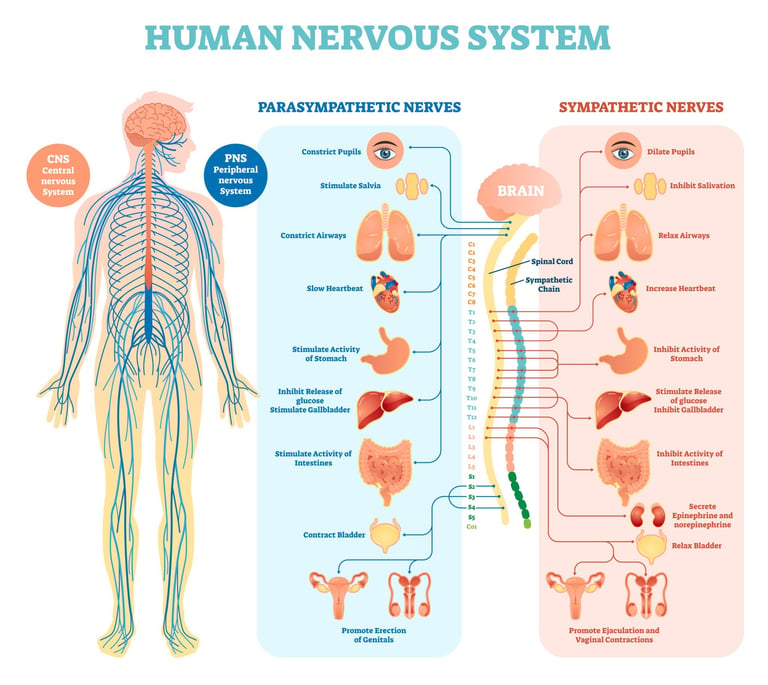How Mental Health Directly Impacts Your Physical Health
Is stress making you sick? Learn how Mental Health directly affects your Physical Health through chronic fatigue, digestive issues, and harms your Immune System. Understand the vital link between your mind and body.
MANAGEMENTGENERAL QUESTIONS
Muhammad Qanit
11/13/20253 min read


How Mental Health Directly Impacts Your Physical Health:
The Mind-Body Connection
Have you ever felt completely exhausted, even after sleeping eight hours? Or maybe you’ve noticed your stomach hurting before a major presentation? These small signals prove a powerful truth: your Mental Health is constantly in conversation with your Physical Health.
We often treat the mind and the body as separate systems, but they are deeply linked. When your Mental Health struggles, your Physical Health struggles too. This can show up as constant fatigue, unexplained pain, or simply a feeling that your whole body is heavy.
At Serenified, we believe that understanding this connection is the first step toward taking true control of your healing journey and improving your overall well-being.
The Immediate Impact of Stress
When you are under heavy stress, your brain triggers the fight-or-flight response. This natural survival mechanism is fine for a quick crisis, but constant worry keeps your body on high alert.
Here’s how stress quickly translates to physical symptoms:
1. Anxiety and Your Digestive System
Constant Anxiety sends urgent messages to your gut, often causing severe digestive issues like constant stomach pain, bloating, or nausea.
Credits: Getty Images
This is one of the clearest signs that your Mental Health is directly damaging your Physical Health. Managing your Anxiety can be the key to improving your body's comfort.
2. Headaches and Muscle Tension
When your mind is racing with stress, your body holds that tension in your neck, shoulders, and jaw. This physical manifestation of stress can lead to constant headaches and chronic pain. Finding ways to release the mental strain is just as important as releasing the muscle knots.
The Long-Term Toll on Your Health
If conditions like Depression or Anxiety are left untreated, the chemical changes in your brain start to cause serious, long-term damage to your Physical Health.
3. Sleep Quality and Fatigue
Chronic stress and emotional pain severely disrupt your Sleep. When you don’t get deep, restorative sleep, your entire body cannot repair itself. This lack of Sleep directly impacts your energy levels and mood, creating a painful cycle between poor Mental Health and poor Physical Health. Improving your Sleep is a powerful path to better well-being.
4. The Immune System’s Exhaustion
Chronic Depression and high Anxiety flood your body with inflammatory hormones. Over time, this constant chemical pressure wears down your Immune System. If you find yourself getting sick frequently or struggling to recover, it's a sign that your Immune System is being exhausted by the fight happening inside your mind. Protecting your Mental Health is a direct way to support your Immune System.
5. Chronic Illness Risk
Sadly, research shows that long-term Depression and Anxiety can increase your risk of serious Physical Health conditions like heart disease and diabetes. This reciprocal relationship means taking care of your Mental Health is a critical part of a complete preventative health plan. Prioritising your emotional well-being is a necessary act of survival.
Your Path to Holistic Wellbeing
Understanding that your mind and your body are one single system is the most powerful piece of Mental Health awareness you can gain. You cannot heal one without caring for the other.
Every step you take to manage your Stress, whether it's using a deep-breathing exercise, talking to a therapist about your Depression, or simply improving your Sleep routine, is a positive step for your entire well-being.
Your Physical Health deserves peace, and your mind deserves care. You are strong enough to give them both.
Frequently Asked Questions (FAQ)
1. Can stress physically hurt my body?
Yes. Prolonged stress triggers the release of cortisol and adrenaline, keeping your body in a constant state of alert. This physically leads to high blood pressure, chronic muscle tension, and digestive problems, directly impacting your Physical Health.
2. How does mental health affect physical health in the long run?
Long-term Depression and chronic Anxiety are strongly linked to increased risk of several Physical Health issues. They deplete your Immune System, disrupt Sleep hormones, and increase inflammation, contributing to serious conditions like heart disease, diabetes, and stroke. Your well-being depends on treating both.
3. Does depression cause fatigue and body aches?
Yes. Depression often causes extreme fatigue that isn't relieved by rest, as well as unexplained body aches and pains. This is a common physical symptom of the mental health disorder. Treating Depression is necessary to resolve the fatigue.
4. Is chronic anxiety dangerous to my body?
Chronic Anxiety is dangerous because it overworks your cardiovascular and digestive systems. It can lead to severe gastrointestinal issues and elevate your heart rate over time. Managing Anxiety is crucial for protecting your long-term Physical Health.
5. Can improving my sleep improve my mental health?
Absolutely. Better Sleep is a foundational step for improving Mental Health. During deep sleep, the brain processes emotions and chemicals, helping to regulate mood. A consistent, quality Sleep routine directly reduces Anxiety and can ease symptoms of Depression.




